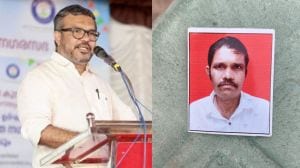The complex issue of assisted suicide: Which countries allow it, and is India one of them?
Assisted suicide and euthanasia, both practices under which a person intentionally ends their life with active assistance from others, have long been contentious topics of debate as they involve a complex set of moral, ethical and in some cases, religious questions.
 Film director Jean-Luc Godard at Cannes Festival on May 25, 1982. (Via AP)
Film director Jean-Luc Godard at Cannes Festival on May 25, 1982. (Via AP)Jean-Luc Godard, one of the legends of French New Wave cinema, died earlier this week by assisted suicide at the age of 91. French newspaper Le Monde reported that the Godard family’s legal advisor, Patrick Jeanneret, has confirmed that the filmmaker died by assisted suicide.
The newspaper quoted Jeanneret as saying, “Godard had recourse to legal assistance in Switzerland for a voluntary departure as he was stricken with multiple invalidating illnesses, according to the medical report”.
French daily Liberation quoted a person close to the family as saying “it was his decision and it was important to him that people know about it,” news agency Reuters reported.
For the last few decades, Godard had lived a reclusive life in the Swiss village of Rolle. Assisted suicide is allowed by Swiss law under certain conditions. Physicians and organisations are allowed to provide assistance to suicide within the framework of the law and under the medical codes of ethics, as per Le Monde, as long as there are no ‘selfish motives’.
Why are assisted suicide and euthanasia controversial topics?
Assisted suicide and euthanasia, both practices under which a person intentionally ends their life with active assistance from others, have long been contentious topics of debate as they involve a complex set of moral, ethical and in some cases, religious questions. Several European nations, some states in Australia and Colombia in South America allow assisted suicide and euthanasia under certain circumstances.
Euthanasia can further be divided into active and passive. The practice of passive euthanasia involves simply stopping lifesaving treatment or medical intervention with the consent of the patient or a family member or a close friend representing the patient. Active euthanasia, which is legal in only a few countries, entails the use of substances to end the life of the patient.
Does India allow assisted suicide or euthanasia?
In a landmark judgment, the Supreme Court of India legalised passive euthanasia in 2018, stating that it was a matter of ‘living will’. According to the judgment, an adult in his conscious mind is permitted to refuse medical treatment or voluntarily decide not to take medical treatment to embrace death in a natural way, under certain conditions. In the 538-page judgment, the court laid down a set of guidelines for ‘living will’ and defined passive euthanasia and euthanasia as well.
It also laid down guidelines for ‘living will’ made by terminally ill patients who beforehand know about their chances of slipping into a permanent vegetative state. The court specifically stated that the rights of a patient, in such cases, would not fall out of the purview of Article 21 (right to life and liberty) of the Indian Constitution.
The SC’s judgment was in accordance with its verdict in March 2011 on a separate plea. While ruling on a petition on behalf of Aruna Shanbaug, the court had allowed passive euthanasia for the nurse who had spent decades in a vegetative state. Shanbaug had become central to debates on the legality of right to die and euthanasia in India.
However, another bench of the Supreme Court, in February 2014, cited inconsistencies in earlier verdicts on passive euthanasia, including the one given in the Shanbaug case, and referred the matter to a Constitution bench. Shanbaug died of pneumonia in March 2015 at the age of 66, 42 years of which she had spent in a room at KEM Hospital in Mumbai, after a brutal rape left her in a permanent vegetative state.
Which are the recent cases dealing with this issue in India?
In 2018, a couple from Mumbai, 88-year-old Narayan Lavate and 78-year-old Iravati Lavate, made headlines when they wrote to then President Ram Nath Kovind, seeking permission for active euthanasia or assisted suicide. While neither of them suffered from a life-threatening ailment, the couple stated in their plea that they had lived a happy life and didn’t want to depend on hospitals for old age ailments.
The letter was forwarded to the Maharashtra government’s chief secretary for consideration but, according to the Lavates, their plea was effectively turned down.
In a recent case, a woman from Bengaluru moved the Delhi High Court in August this year to stop her Noida-based 48-year-old male friend, who has a debilitating health condition, from travelling to Europe, allegedly to undergo assisted suicide or euthanasia.
The woman, who has described herself as a close friend of the patient, had pleaded that the man’s parents, family and friends would suffer “irreparable loss” and “hardship” if the plea to halt his travel is not allowed.
However, the woman withdrew her petition later as it had “deeply traumatised” her friend.
- 01
- 02
- 03
- 04
- 05






































